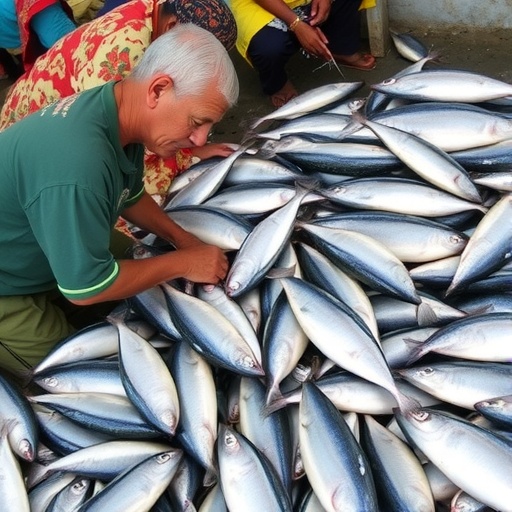In recent years, the intricate relationship between ocean resources and communities dependent on them has garnered increasing scrutiny, particularly regarding fish exports. The new study, “From ocean to markets: fish exports threaten nutrition security in coastal communities,” published in Commun Earth Environ, highlights alarming trends that place coastal communities at risk of nutritional deficiencies. The research, conducted by Brun, Celis, Dubrana, and their collaborators, provides a deep dive into how the flourishing trade of fish is undermining local food security, an issue warranting urgent global attention.
Coastal communities around the world have long relied on fish not just as a primary source of protein, but also as a critical component of their cultural identity and livelihood. Traditionally, these communities have engaged in small-scale fishing, which supports their diets and sustains their economic needs. However, the dynamics are shifting dramatically due to increasing pressures from global markets that value fish exports more than local consumption.
Emerging markets for seafood have created an economically lucrative landscape for fishermen, yet the costs to local nutrition and food sovereignty are often overlooked. The study reveals how the drive for profit leads to overexploitation of fish stocks that play a vital role in local diets. As fish is extracted at an alarming rate for export, the nutritional impact on community diets cannot be underestimated. Traditional reliance on fish is being shaped by the market’s demand rather than nutritional needs, prompting questions about sustainability and community welfare.
One major factor contributing to this crisis is the increased global demand for high-value fish species, which has caused fishermen to target specific types of fish instead of maintaining a diverse catch that would support nutritional balance. The researchers illustrate that the prioritization of high-export fish species significantly diminishes the variety of fish available to local populations, thus narrowing their dietary options and heightening the risk of malnutrition. This has far-reaching implications, especially in regions where socioeconomic factors preclude access to alternative sources of protein.
Moreover, the findings underscore the paradox of abundance: while fish are plentiful and profitable for export, they are becoming scarce for the communities that need them the most. The study provides a stark reminder of the unsustainable practices that occur when local communities are sidelined in favor of global trading ambitions. As certain fish species disappear from local catch, the implications ripple through the food systems of coastal populations, leading to a disconnect between availability and accessibility.
In addition to these economic and environmental challenges, the research identifies a regulatory gap that exacerbates the situation. Many coastal nations struggle with enforcement of sustainable fishing practices, often due to lack of resources or political will. The study highlights the importance of developing robust governance frameworks that prioritize community nutrition alongside export interests. Sustainable practices must be embraced not just for ecological reasons, but to ensure the food security of vulnerable populations.
Another crucial aspect the study addresses is the intersectionality of culture, health, and nutrition. Fish is not merely a commodity; it holds immense cultural significance for many coastal communities. The shift toward export-driven practices threatens to erode these cultural ties while also impacting physical health outcomes, contributing to a broader public health crisis. Without intervention, the reliance on fish exports could lead to the loss of traditional knowledge surrounding local diets and nutrition.
The authors also emphasize the potential role of advocacy in addressing these challenges. By raising awareness of the nutritional threats posed by fish exports, researchers, policymakers, and community leaders can collaborate to forge a path forward that acknowledges the rights of coastal populations. Collective efforts could pave the way for stronger policies that protect local access to fish while also ensuring the viability of fish stocks for future generations.
While the study outlines the dire consequences of unchecked fish exports, it also highlights pathways for hope and change. Encouraging local fish consumption through community programs can fortify food sovereignty. This includes initiatives aimed at enhancing awareness about the nutritional value of local fish and promoting responsible fishing practices among community members. Empowering local fishermen to prioritize sales within their communities can be one way to restore balance.
As fish exports continue to threaten nutrition security in coastal communities, strong international collaboration will be essential. There is a pressing need for global partners to engage in dialogues that address these imbalances, recognizing that local food systems must be a priority when discussing trade agreements. Collaborative initiatives can help ensure that the needs of local populations are considered, bolstering their access to the fish that underpin their dietary health.
The implications of this research resonate deeply. It calls attention to a multifaceted crisis—one that intertwines economics, culture, health, and environmental sustainability. There is an urgent need to shift the narrative and policies surrounding fish exports, protecting not only the livelihoods of fishermen but also the nutritional health of communities for generations to come. As these communities navigate the turbulent waters of global trade, research like this serves as both a warning and a guide, laying the groundwork for a more equitable system.
In conclusion, although fish is increasingly viewed as a global commodity, the need for conscientious practices that prioritize coastal communities cannot be overstated. The findings presented in this pivotal study deliver a clarion call to redefine our relationship with ocean resources, ensuring the well-being of those who depend on them in the face of rising export pressures. The future of coastal nutrition security hinges on our collective response to these critical challenges and choices we must make today.
Subject of Research: Fish exports and nutrition security in coastal communities
Article Title: From ocean to markets: fish exports threaten nutrition security in coastal communities.
Article References:
Brun, V., Celis, A.I.J., Dubrana, C. et al. From ocean to markets: fish exports threaten nutrition security in coastal communities.
Commun Earth Environ 6, 892 (2025). https://doi.org/10.1038/s43247-025-02820-1
Image Credits: AI Generated
DOI: https://doi.org/10.1038/s43247-025-02820-1
Keywords: fish exports, nutrition security, coastal communities, food sovereignty, sustainable fishing




